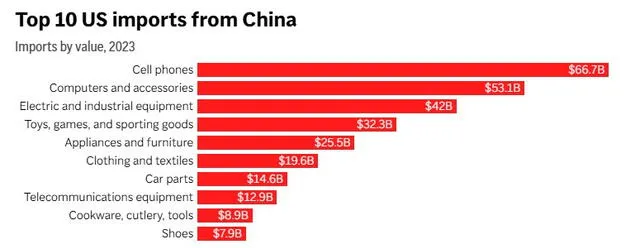China retaliates with tariffs on U.S. imports and opens investigation into Google
China retaliates against U.S. trade policies by imposing tariffs on American imports and launching an investigation into Google’s Android system.

In response to recent U.S. trade policies, China has escalated its economic measures by imposing tariffs on American imports and launching an antitrust investigation into Google. This move highlights the growing tensions between the two economic superpowers, further intensifying the trade war that has been simmering for years. With the new tariffs targeting key U.S. exports and a probe into one of the most influential tech companies in the world, China is signaling its intent to assert economic power and challenge U.S. policies. The timing of these actions raises questions about the future of global trade relations and the ongoing dispute between the U.S. and China.
The tariffs and investigation mark a new phase in the escalating trade conflict, with China retaliating against U.S. trade measures that it views as harmful to its economy. As both countries engage in this economic standoff, the implications of these actions extend beyond their borders, potentially impacting businesses and markets globally.
What are the details of China’s tariffs on U.S. imports
China has imposed new tariffs on a range of U.S. products, including agricultural goods, coal, liquefied natural gas (LNG), and certain industrial machinery. These tariffs are designed to target areas where China has the leverage to inflict economic harm on U.S. exports. The move is a direct response to the U.S. administration’s decision to implement its own tariffs on Chinese goods, which have already been in place for several years.
The new tariffs are particularly impactful for industries such as energy, agriculture, and technology. For instance, the LNG tariffs could affect U.S. natural gas suppliers who have relied on China as a key export market. Similarly, agricultural tariffs could harm U.S. farmers who depend on China as a major buyer of crops like soybeans and wheat. These retaliatory actions underscore the tit-for-tat nature of the trade war and signal that China is willing to use its market power to push back against U.S. policies.
According to Associated Press, Trump planned to talk with Chinese President Xi Jinping in the coming days.
"It is being scheduled and will happen very soon", White House Press Secretary Karoline Leavitt said Tuesday.

Photo: Christopher Rugaber/AP
Google under investigation: China’s antitrust probe
In addition to the tariffs, China has opened an antitrust investigation into Google, one of the largest tech companies in the world. The investigation is focused on Google’s Android operating system and its dominance in the mobile market. While Google services are not directly available in mainland China due to censorship restrictions, the company still operates in the country through its advertising business and maintains a significant presence with offices in major cities like Beijing and Shanghai.
This move comes as part of China's broader strategy to scrutinize the business practices of foreign tech companies operating in its market. With Google’s Android system being one of the dominant platforms globally, China’s antitrust investigation raises concerns about the company’s market power and its potential impact on local competition. The investigation is being seen as a response to U.S. actions but also as a way for China to ensure that its domestic companies are not overshadowed by foreign tech giants. Experts believe the probe could have a long-term impact on Google’s operations in China and potentially lead to stricter regulations for foreign firms.
